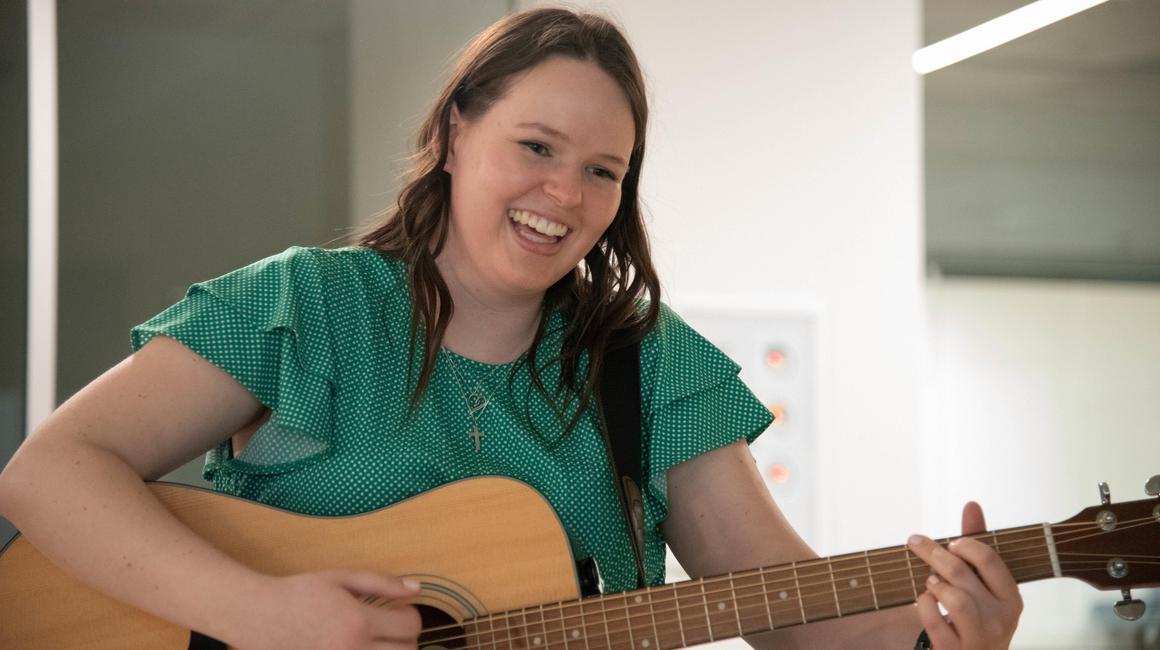Rachel Anderson plucks individual notes on her guitar while humming softly, keeping a watchful eye on the heartrate monitor next to her. The wires and leads are attached to a premature baby resting in the neonatal intensive care unit (NICU) at UPMC Children’s Hospital of Pittsburgh where she rotates as a music therapy student.
The baby’s heartrate is high, and in collaboration with the NICU medical team, Rachel
uses the strategies she learned at the Mary Pappert School of Music to help bring
it to a safer level.
As Rachel slows her tempo on the guitar, the baby’s heartrate decreases – matching
her pace.
“I just feel so blessed to be doing this,” she says. “It’s important for infants in
the NICU to create an environment of relaxation.”
In addition to medical benefits, music therapy can provide spiritual and emotional
support and social opportunities. Rachel enjoys catering each bedside experience to
the child’s individual needs to foster connections.
“We might write our own lyrics to a song about their hospital visit or diagnosis.
We can record the heartbeat of a child and incorporate it into a song for parents
if the child is really sick and they pass,” says Rachel. “It’s about the music therapist
interacting with patients and families, forming a rapport and using music as that
medium.”
Despite originally planning to work in nursing homes, Rachel’s time at UPMC Children’s
solidified her decision to pursue a career in a hospital setting because it provides
so many opportunities to support patients and their families.
“I saw a toddler consistently over the semester who didn’t have a life outside the
hospital,” says Rachel. “To provide eye contact and bright, colorful instruments that
sounded really fun made the hospital environment a little better. Knowing that I can
enhance quality of life means everything.”
Rachel knew she wanted to help others and make an impact on the world from a young
age. Though she’s from Frederick, Maryland, she also knew she wanted to pursue these
aspirations in Pittsburgh after visiting Duquesne in middle school with her aunt,
a School of Nursing alumna.
“Even back then I said I was going to Duquesne,” says Rachel. “When I decided on music
therapy, I found that Duquesne was one of the few schools that offered it. I fell
in love with the program.”
Rachel enjoys spreading awareness about her intended profession and the impact it
can have on others. “A large part of music therapy is advocating for what we do as
an accredited profession,” she says. “We’re trained clinicians in addition to musicians.”
Rachel’s primary instrument is the clarinet, but through the music therapy program
she’s worked on her singing voice and learned to play piano and guitar. With these
skills under her belt, she’s decided to pursue even bigger goals. She plans to learn
the ukulele and add additional songs to her repertoire in preparation for her next
role in a psychiatric hospital.
After graduation, Rachel hopes to become a music therapist at a general hospital so
she can help patients of all ages with diverse needs. Her time at Duquesne and the
convenient campus location have given her the professional confidence and experience
needed to get a running start on this meaningful career.
Rachel is grateful that Duquesne’s proximity to numerous hospitals and clinical sites
has provided so many hands-on learning opportunities, and she looks forward to connecting
with other students in new, meaningful ways as the Duquesne University College of
Osteopathic Medicine welcomes its first class.
“I prioritize a holistic health approach in my own practice and consider physical,
emotional and social wellbeing. It’s really exciting that Duquesne is expanding and
working to train new professionals in these resources,” she says. “Opportunities are
here when I want to take them. Duquesne and Pittsburgh are flourishing.”
News Information


